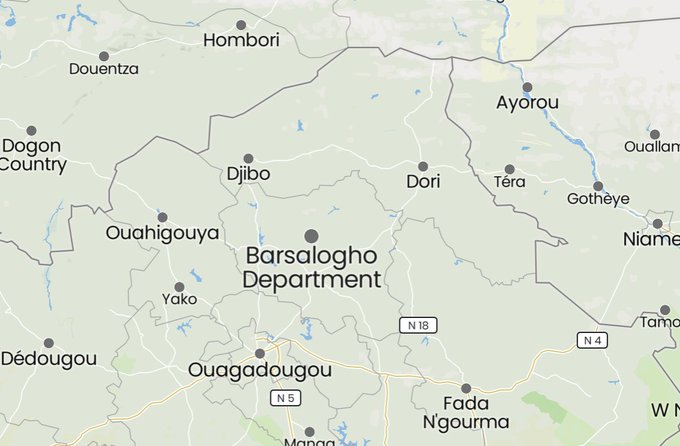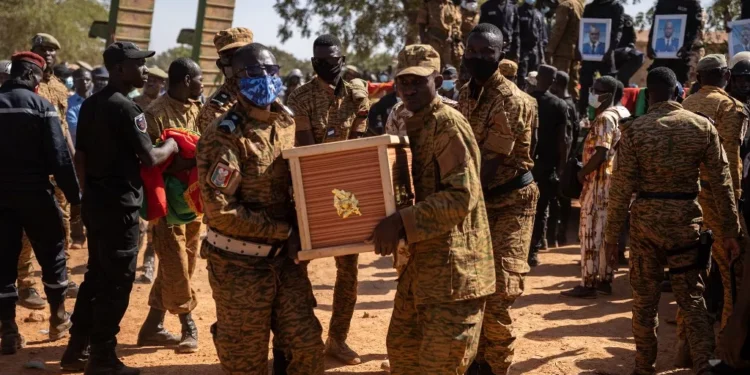On August 26, 2024, the Burkinabe town of Barsalogho was the scene of yet another devastating attack, where around 200 people were killed and 140 others injured. This assault, carried out by the al-Qaeda-linked group Jama’at Nusrat al-Islam wal-Muslimin (JNIM), is part of a continuing series of violent offensives that have plagued Burkina Faso in recent years, deepening the crisis in the already-troubled West African country.

Background on Jama’at Nusrat al-Islam wal-Muslimin (JNIM)
JNIM, a coalition of jihadist groups in West Africa, has been a significant destabilising force in the Sahel region since its formation in 2017. The group, which is linked to al-Qaeda, emerged from the merger of several extremist factions, including Ansar Dine, al-Mourabitoun, and the Saharan branch of al-Qaeda in the Islamic Maghreb (AQIM). JNIM has claimed responsibility for numerous attacks across Mali, Niger, and Burkina Faso, targeting both military forces and civilians in its quest to expand its influence and control over the region.
In Burkina Faso, JNIM’s operations have become increasingly brazen and deadly. The group has exploited the country’s political instability, economic challenges, and ethnic tensions to recruit fighters and establish strongholds in rural areas. As a result, large parts of northern and eastern Burkina Faso have become inaccessible to the government, with JNIM exercising de facto control over these territories.
JNIM has orchestrated several attacks across Burkina Faso and Mali, establishing itself as the most active militant group in the Sahel region, according to data from the conflict-tracking organisation ACLED. The data shows that between 2017 and 2023, JNIM was implicated in over half of the violent incidents in the Sahel area, largely due to its enhanced proficiency in deploying roadside bombs, mortars, landmines, and rockets. ACLED’s reports indicate that JNIM’s most intense encounters were with Burkina Faso’s military (1,762 encounters) and the Malian army (945 encounters). The group also frequently targets volunteer militias and communities perceived as supportive of the governments in these countries.
In February 2024, JNIM militants attacked a mosque and a church in northern Burkina Faso, resulting in the deaths of dozens of worshippers in the villages of Natiaboani and Essakane. Later that month, the group launched even deadlier assaults on the towns of Kamsilga (Kadiogo Province – Central Burkina Faso), Soro, and Nodin (Yatenga Province – Northern Burkina Faso), where they killed over 170 people, including women and children.
Months later, JNIM claimed responsibility for one of the most lethal attacks on government forces, stating that they killed over 100 soldiers at a military base in Mansila (Yagha Province), a northern region near Niger. Security experts noted this as one of the deadliest strikes against government troops, with the group also claiming to have captured seven soldiers and seized significant amounts of weapons and ammunition. The group funds its activities through ransom payments from kidnappings, taxing locals, smuggling weapons, and extorting drug and human traffickers in the Sahel region.
The Deadly Attack on Barsalogho
In Burkina Faso, terrorist attacks remain a frequent occurrence. The most recent one in Barsalogho, a rural commune in the Sanmatenga province (Centre-Nord region), has shocked many. According to government spokesman Jean Emmanuel Ouédraogo, the attack occurred in broad daylight while people were working in the community. He described it as “cowardly and barbaric.”
No official death toll has been provided. However, a collective of locals reported at least 400 deaths in a statement issued on August 25, 2024. The statement cited testimonies from families and credible local sources, pending an exhaustive count of the loss of life. Several news outlets reported that hundreds of wounded were admitted to hospitals in Kaya (40 kilometres from Barsalogho) and Ouagadougou (140 kilometres from Barsalogho).
According to the “Collectif Justice pour Barsalogho,” the attack “occurred because the people of Barsalogho came out in large numbers to dig a trench around the commune to serve as a fighting trench against the terrorists, as recommended by President Ibrahim Traoré.”
Indeed, during a meeting with VDPs (Volunteers for the Defense of the Homeland) on May 23, 2024, in Ouagadougou, the Head of State, Ibrahim Traoré, acting as Supreme Chief of the Armed Forces, ordered civilians to build trenches for their safety in case of a terrorist attack, while waiting for the military to intervene. “You must organise people everywhere to clear the roads (…) everyone must get to work. You must dig trenches in your communes and villages (…) you will mobilise your populations to dig trenches and protect yourselves until the machines arrive to deepen the trenches,” declared the President.
The attack on Barsalogho has plunged the local population into a state of anger. “We remind the authorities that this tragedy fully engages the responsibility of the State, as it is the consequence of a choice of method that appears, so far, more than hazardous, particularly the trench strategy and military negligence on the part of the detachment. Our parents have been led to the slaughter,” states the Collectif’s press release.
This is not the first time in the history of the “land of upright men” that an attack has occurred during trench construction work. In June 2024, Rassouli, a village in the Yatenga province (northern region), was the site of a security incident. “The VDP and FDS, supported by the local population, were busy digging trenches when they were surprised and massacred by terrorists,” reports journalist Newton Ahmed Barry.
Beyond the messages of support and compassion for the government, some civil society organisations are raising their voices. This is the case with the “Socle Citoyen pour la Libération” (SOCL), which is calling on the government to break its silence and communicate responsibly, sincerely, and promptly, to avoid misunderstandings, interpretations, and superstitions of any kind. “In the name of the national interest, this situation calls on the entire executive, actors, and all the institutions of the Transition to acknowledge the difficulties in this struggle and, above all, to undertake a full and thorough reassessment of the management of the security crisis and the Transition to save national unity and the integrity of our territory,” the press release reads.
It should be noted that since President Ibrahim Traoré came to power in October 2022, the government of Burkina Faso has stopped issuing press releases related to terrorist attacks, and all media outlets are required to comply with this directive.
Following the attack in Barsalogho, people have started to speak out on social media. According to one Internet user, “We cannot remain silent for long in the face of the tragedies that occur at regular intervals in Burkina. Our government has chosen to take a vow of silence and hide the truth from us. Our journalists and other intellectual elites have chosen, out of fear of kidnappings, to respect this vow.
In a country where denouncing government actions can lead to all forms of reprisal, how long will Burkinabè remain silent in the face of the loss of their families? What will be the miracle solution of the current regime, which promised three months to end terrorism in Burkina Faso? Will President Ibrahim Traoré finally abandon his plan to require the population to dig trenches to secure themselves? These are just some of the questions Burkinabès hope to have answers to.
What are the Security Implications for Burkina Faso and Neighbouring Countries?
The Barsalogho massacre underscores the severe security challenges facing Burkina Faso. The country has been struggling to contain the spread of jihadist violence since 2015, and the situation has only worsened in recent years. The attack not only demonstrates JNIM’s growing capabilities but also highlights the fragility of Burkina Faso’s military forces, which have been unable to protect civilians or prevent the group’s territorial gains.
The implications of this attack extend beyond Burkina Faso’s borders. JNIM’s activities have a destabilising effect on the entire Sahel region, threatening the security of neighbouring countries such as Mali, Niger, and even coastal nations like Ghana and Côte d’Ivoire. These countries have already experienced spillover violence from Burkina Faso, and the increasing boldness of JNIM could lead to more cross-border attacks, further exacerbating the region’s security crisis.
Moreover, the attack on Barsalogho raises concerns about the potential for a humanitarian disaster. The displacement of civilians, the destruction of infrastructure, and the disruption of agricultural activities have left many communities in dire need of assistance. The international community, including the United Nations, have condemned the violence, but more coordinated and robust efforts are needed to address the root causes of the crisis and support the affected populations.
Conclusion
The massacre in Barsalogho is a stark reminder of the deepening crisis in Burkina Faso and the broader Sahel region. As JNIM continues to assert its dominance through brutal attacks, the security of millions hangs in the balance. The international community must urgently address this growing threat, not only to stabilise Burkina Faso but also to prevent the further spread of violence across West Africa. Without decisive action, the region’s fragile peace could unravel, leading to even greater suffering for its people.
References
https://news.un.org/en/story/2024/07/1152396
https://acleddata.com/?s=sahel






























